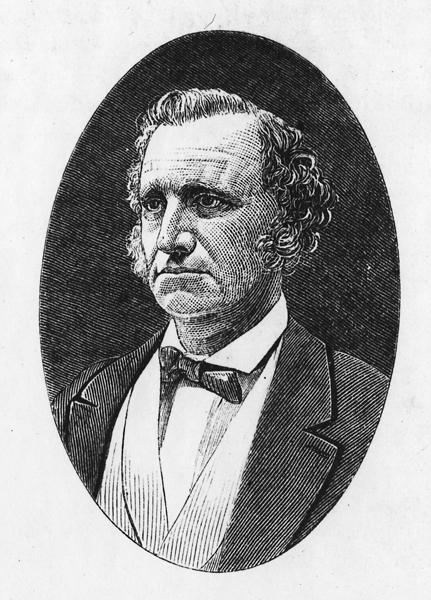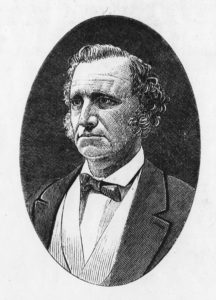Benjamin Franklin Flanders
During Reconstruction, Unionist Benjamin Flanders was selected as Louisiana’s first Republican governor in June of 1867.

Courtesy of State Library of Louisiana
Benjamin Franklin Flanders. Creator unknown. Source: Jewel, Edwin L., Crescent City Illustrated, Page 43.
During Reconstruction, Unionist Benjamin Flanders was selected as Louisiana’s first Republican governor in June of 1867. Appointed by New Orleans’ military district commander Gen. Philip Sheridan, Flanders quickly encountered conflict among Republicans about control of the party and political patronage. While so-called Radical Republicans wanted to deal with former Confederates sternly and restructure southern society, the more moderate wing of the party favored a more conciliatory approach. A little more than six months after taking office, Flanders resigned to protest the actions of Maj. Gen. Winfield Scott Hancock, a moderate Republican who replaced Sheridan. Despite the political wrangling, Flanders continued to influence Louisiana government for some years after his official term ended.
Benjamin Franklin Flanders was born in Bristol, New Hampshire on January 26, 1816, the youngest of Joseph Flanders’s four sons. He graduated from Dartmouth College 1842 and moved to New Orleans, where he studied law in the office of Charles M. Emerson, also a Dartmouth alumnus. Rather than pursuing a law practice, however, Flanders accepted an appointment as principal of a public school in early 1844 and, the following year, became a part owner and editor of a Whig newspaper, the New Orleans Tropic. Flanders served as Third Municipal District alderman from 1848 until 1852, when he began a ten-year stint as secretary and treasurer of the New Orleans, Opelousas and the Great Western Railroad Company.
Before the Civil War, he opposed secession. In January 1862, a self-styled vigilante committee angry that Flanders assisted some Union prisoners in New Orleans forced him into exile. Leaving his family behind, Flanders fled to Cairo, Illinois and then to New York City, where he resided until after the fall of New Orleans to the Union.
After Flanders returned to New Orleans, Maj. Gen. Benjamin Butler appointed him city treasurer from July to December, and for some months he headed a Commission on Relief. Elected to the US Congress as a Unionist in November 1862, Flanders served for a few months in 1863 before being appointed supervising special agent of the Treasury Department for the Gulf Coast states, a position to which he was reappointed in 1866. As special agent, Flanders earned commissions from the sale of confiscated cotton. After the war, he led the movement to organize the Republican Party in Louisiana, during which he garnered attention for leadership.
In 1864, Flanders was an unsuccessful candidate for governor on the Radical Unionists’ ticket. That year he also became president of the First National Bank of New Orleans. Flanders became a Republican during the war and supported congressional Reconstruction afterwards. In June 1867, Gen. Philip Sheridan appointed him governor of the state. His tenure, however, proved short. Flanders resigned from office when Sheridan, whose views on Reconstruction he shared, was replaced by Maj. Gen. Winfield Scott Hancock, who took a more lenient view of the former Confederates. After Flanders’s departure, Hancock appointed Joshua Baker, who governed for four months until Henry Clay Warmoth succeeded him on July 13, 1868.
In 1870, Warmoth appointed Flanders mayor of New Orleans, a position to which Flanders was later elected. Flanders also served as assistant treasurer of the United States in New Orleans from 1873 to 1882. His last try for political office was an unsuccessful, token effort as the Republican nominee for state treasurer in 1888. Flanders died in retirement on his country estate, near Youngsville, in Lafayette Parish on March 13, 1896 and was interred in Girod Street Cemetery in New Orleans.
This entry was adapted from the Dictionary of Louisiana Biography, a publication of the Louisiana Historical Association in cooperation with the Center for Louisiana Studies at the University of Louisiana, Lafayette.
Sources: Benjamin Franklin Flanders Papers (LSU); Biographical Directory of the American Congress, 1774-1949 (1950); National Cyclopedia of American Biography (1906); Jewell’s Crescent City Illustrated (1872); Diary and Correspondence of Salmon P. Chase (1903); Jessie A. Marshall, ed., The Private and Official Correspondence of General Benjamin F. Butler (1917); New Orleans Daily Picayune, March 14, 1896.
